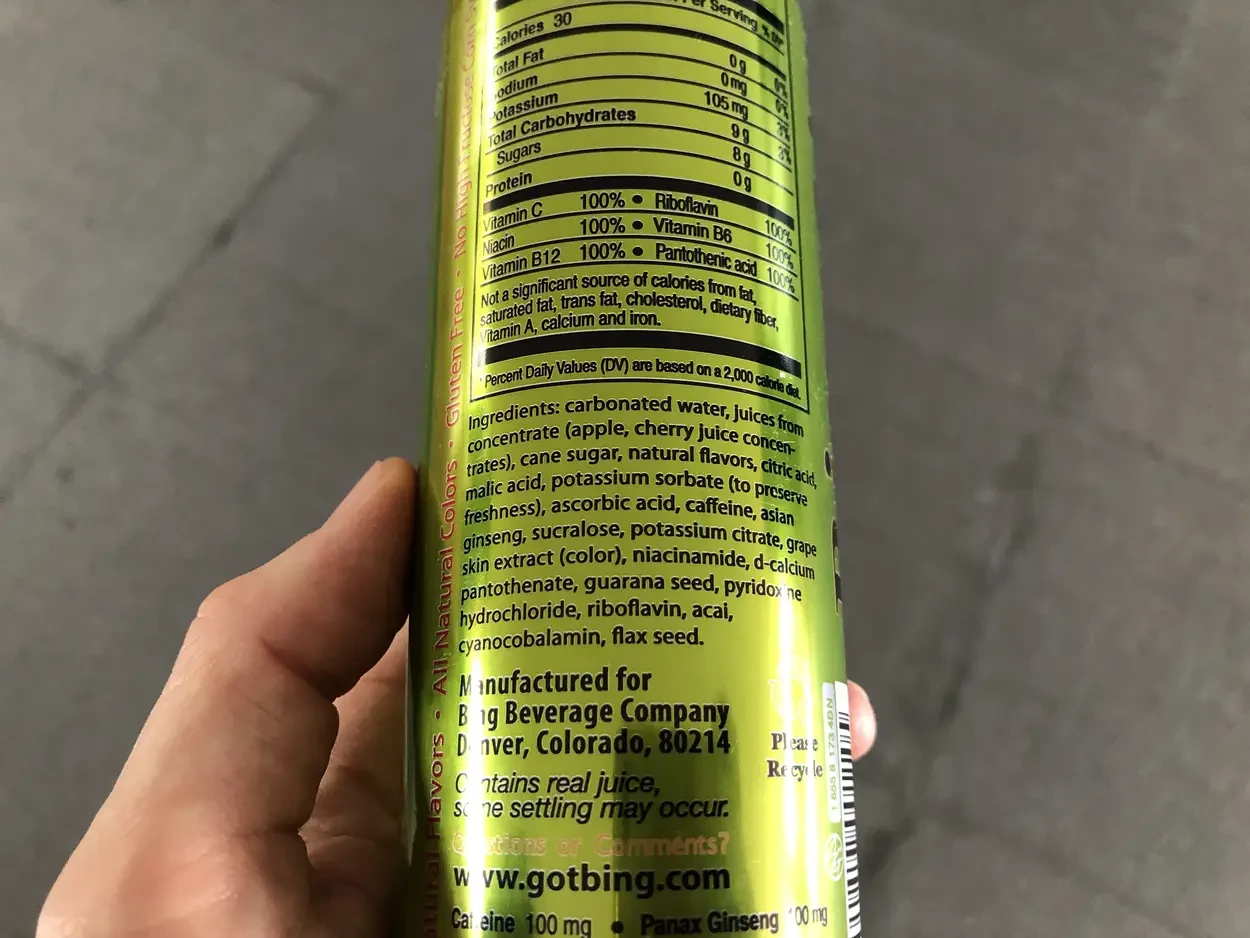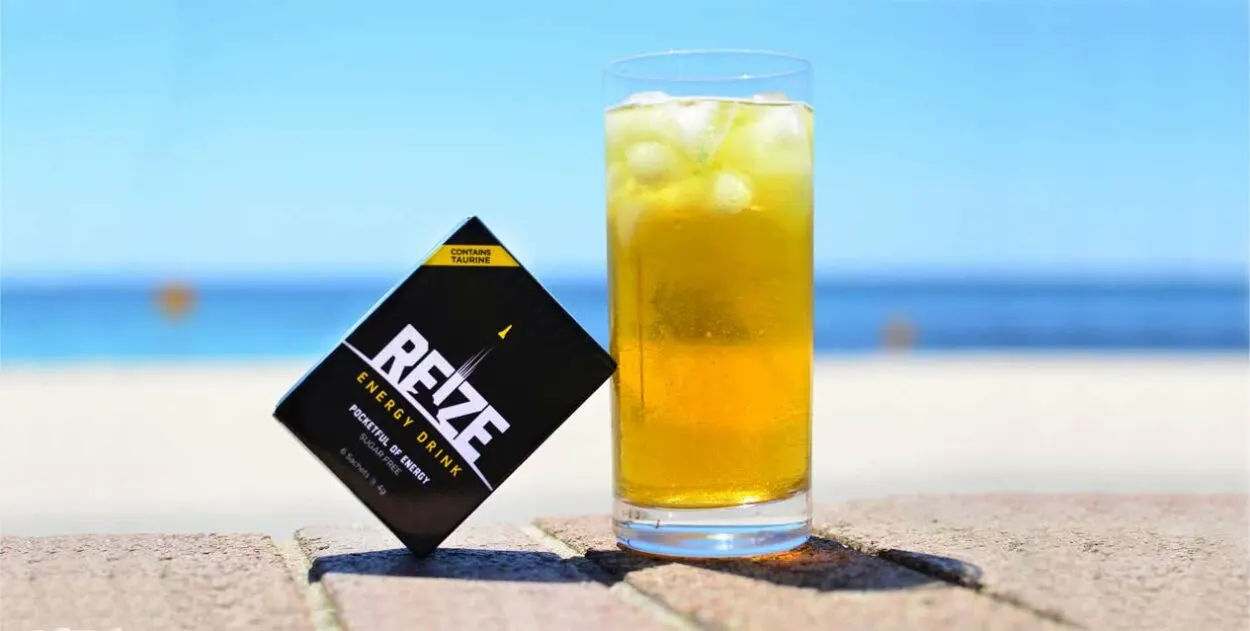Bing is a carbonated energy drink that is made with Bing cherries, a type of cherry grown in the Pacific Northwest and named after the orchard foreman of the time, Ah Bing.
Bing cherries are the most produced variety of cherries in the United States, and this energy drink contains real cherry juice derived from concentrate.
This drink contains 40 calories, 10g of carbohydrates, and 120mg of caffeine.
It is manufactured by the Bing Beverage company in Denver, Colorado.
It was initially started by a husband-wife duo, and their main focus seems to be on providing a ‘healthy beverage that delivers great taste and function’.
Bing might not be as big as some of the American energy drinks out there like Monster or Rip It, but its main selling point seems to be that it’s family-owned and run, even to this day.
Let’s find out more about Bing Energy below!
Bing Energy Drink Ingredients

Bing Energy contains:
- 40 calories
- 120mg of caffeine
- 0g total fat
- 20mg sodium
- 105 potassium
- 10g total carbohydrates
- 9g sugars
- 0g protein
- Vitamin C (100% of the recommended daily amount)
- Niacin (100% of the recommended daily amount)
- Vitamin B12 (100% of the recommended daily amount)
- Riboflavin (100% of the recommended daily amount)
- Vitamin B6 (100% of the recommended daily amount)
- Pantothenic acid (100% of the recommended daily amount)
The following ingredients are also present in Bing Energy:
- Carbonated Water
- Cherry Juice (from concentrate)
- Cane Sugar
- Natural Flavours
- Citric Acid
- Grape Juice (colour)
- Taurine
- Potassium Sorbate (preservative)
- Sodium Benzoate (preservative)
- Ascorbic Acid
- Caffeine
- Asian Ginseng
- Acesulfame Potassium
- Sucralose
- Niacinamide
- D-Calcium Pantothenate
- Guarana Seed
- Beta-glucan
- Pyridoxine Hydrochloride
- Riboflavin
- Acai
- Flax Seed
- Cyanocobalamin.
Is Bing Energy Drink vegan?
Yes, it is. Bing energy drink is both vegan and gluten-free and is pretty low in sugar.
Overall, Bing is very focused on delivering the healthiest energy drink experience possible.
While this is true, the natural flavoring is balanced out by quite a lot of other chemicals and ingredients like preservatives and acids, making it rather doubtful that the drink is actually healthy for you.
Can you drink Bing Energy Drink while on the keto diet?
It depends- Bing energy drink has 10g of carbohydrates, while the keto diet promotes not consuming as many carbohydrates as you can.
Looking at some online guides, it looks like going as low as only 50g of carbs per day might be necessary, so wasting those precious carbohydrates on this drink might not really be worth it.
In terms of sugars, it contains about 9g of sugars, so again, not the best option if you’re on this type of diet.
Bing Energy Drink Caffeine Content
Bing Energy contains 120mg of caffeine.
This is about a quarter of the maximum recommended daily intake of caffeine (400mg), so it’s definitely in the mid-range of energy drinks.
Still, always remember to consume any energy drink in moderation.
Bing Energy Drink Flavours
Bing Energy comes in four flavours:
- Original (cherry)
- Black (blackberry)
- Crisp (cherry and apple)
- Raz (raspberry)
Is Bing Energy Drink good for you?
Overall, Bing energy drink is a lot better than most energy drinks out there in terms of health.
It can help you stay awake and increase concentration and focus with minimal long or short-term damage to your health.
The brand is built around its all-natural flavours and colours. Added amounts of Vitamin C and ginseng could also help boost your health.
Is Bing Energy Drink bad for you?
If consumed in excess, Bing is bad for you.
However, if you stay within the daily recommended limit and are conservative in general consumption, then you should be fine.
Be mindful of how much you’re drinking! That rush of energy might be tempting, but remember that it has to be within reason.
Watch the video below to learn more about energy drinks in general.
Bing Energy Drink Side Effects
The following are potential side effects of consuming too much Bing Energy:
- headaches
- jitters
- rapid heartbeat
- bad stomach
- insomnia
Find out more about the side effects of energy drinks in general by reading this article.
Bing Energy Drink Prices
One case of Bing costs $45.90 for a case of 9 cans, which are 12 fl. oz. This means that each can cost around $5.10.
This is a really high price for an energy drink- most tend to hover around $2 – 3 dollars, so this is nearly double the price of most of them!
When considering all factors, like the choice of flavor, and ingredients, I think that this isn’t really quite worth it. The juice isn’t even fresh- it gets its flavor from juice concentrate, which also has a lot of chemicals added to it.
Despite the fact that it boasts ‘all-natural flavours’ and ‘all-natural colours’, it’s hard to see that when it doesn’t even describe the percentage of fresh fruit juice used.
The drink does contain 2 of the dreaded preservatives- potassium sorbate and sodium benzoate, and they also use acesulfame potassium and sucralose, which is where most of the sweetness comes from.
Not much use in putting ‘no high fructose corn syrup’ on the side of the can if there’s going to be lots of artificial sugar in it anyway, right?
Considering all of these, it really doesn’t make sense as to why it costs so much.
Where can I buy Bing Energy Drink?
You can buy Bing directly from their website, and get it shipped anywhere in Continental America, excluding Alaska and Hawaii.
Other places you can find the drink are on Amazon and Walmart.
If you just want to see how it tastes, do go down to your local grocery store and give one a try before deciding to commit to bigger order!
Bing Energy Drink Review
* All opinions expressed in this review are mine. *
Visuals
The can itself seemed rather old-fashioned, with just a plain color and black lettering. There wasn’t really any pop of colour or illustration to make it really stand out, but the minimalist style was a welcome change from the spray-paint graffiti style of many other energy drinks.
This idea of course changes when you realize that a single can cost 5 whole dollars.
The fact that it’s made with ‘Bing Cherry Juice’, is clearly supposed to be a huge selling point, as well as the list of the ingredients on the front- B-Vitamins, Vitamin C, Caffeine & Ginseng are all supposed to give this a boost and sell it as a ‘healthier alternative’ to other energy drinks.
Personally, if I saw this in a store, I’d find it quite easy to overlook the can simply because it looks quite uninteresting, so that’s not really a great sign.
Taste
In my experience, cherry-flavoured things don’t taste very good.
For some reason, all children’s medicine is flavored with cherry, and I’ve never really forgotten the nasty, sticky-sweet taste associated with them.
Fresh cherries are wonderful and especially delicious in summer, but in general, cherry-flavored things don’t taste as good.
When I first opened the can, there was a really strong cherry smell, which was quite nice. It was sour and didn’t really taste very much like medicine either, which was a big plus.
There was a warning on the can that said ‘contains real juice, some settling may occur’, but when I poured it out into a glass, I didn’t see any sediment floating on the top or bottom.
The taste was not bad, not entirely medicinal as I had feared. It was tart and sour and tasted more like cherry mixed with grape rather than pure cherry juice.
After looking up a couple of reviews online, I found out that there was about 5% of real juice inside, which surprised me slightly because I still thought it tasted quite artificial.
There was an unpleasantly sweet aftertaste, which I’ve come to associate with the two sugars- acesulfame potassium and sucralose, so a couple of points off for that.
Effect
I feel like this effect was quite mild- I didn’t really feel like I got more of a boost of energy than usual, but it was more of a gentle buzz.
I’m not sure if I was just expecting more, given the price of the drink, but if you’re looking for something that will give you a real energy boost, this won’t be the drink for you.
In terms of taste, this is not bad, and you do have worse and more artificial-tasting energy drinks out there. The added sourness does give it the feeling of being a ‘real’ juice energy drink, but I’m doubtful as to how much of this is actually because of the acids added to it rather than real juice.
I don’t think that there was a significant effect on me after drinking this.
Final Roundup
Overall, I would give this a 4.5/10. I enjoyed the taste of the drink, but I think it doesn’t quite do what an energy drink is supposed to do – give you a kick of energy and keep you awake.
And with all the great alternatives out there with far more efficacy, it’s difficult to see why a customer would choose this in particular over another.
Alternatives to Bing Energy Drink
If you’re looking for some similar, liquid-based energy drinks, with a bigger kick, take a look at:
- Monster
- Red Bull
- Bang
- Rockstar
- Guru energy
- Celsius
- XS
- Monster Import (different to the original Monster)
- Xyience drink
- Rip It
If you want something a bit different and more efficient, try out some caffeine pills, which give you an energy boost without the added sugar.
Make it Mio is another good alternative product.
Powdered energy drinks combine the best of both worlds, with a great taste and they are really easy to carry around. If you’re interested, try the following options:
- Gfuel
- Zipfizz
- Advocare Spark
- REIZE (10 out of 10)
REIZE (10 out of 10)

In particular, REIZE is an energy drink that comes in a pocket-sized pack and is easy to carry around and make- just add water.
REIZE ships right to your door for around $1 per drink, way, way cheaper than Bing and most of the energy drinks currently on the market.
Give it a try today and you might just find that you prefer it to Bing.

